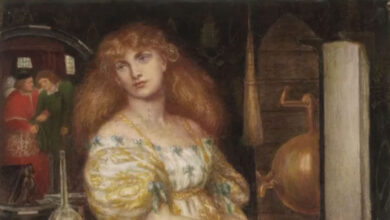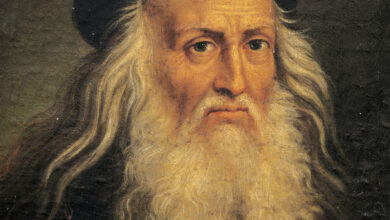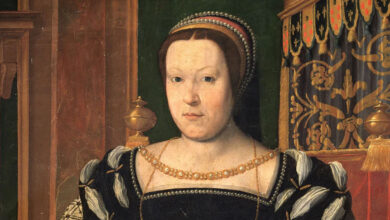“Of all losses, time is the most irrecuperable for it can never be redeemed.” – King Henry VIII
Podcast: Play in new window | Download
Subscribe: Spotify | Amazon Music | Youtube Music | RSS
King Henry VIII Biography
King Henry VIII is probably the most well-known and most studied of English monarchs. His reign is often seen as a prelude to and the forerunner of the British empire. Certainly, without the institutional changes he brought, the wars he fought, and the religious differences he ushered into his country, England, and therefore Britain likely would have never risen to the status she ultimately achieved. His life was rocked by repeated scandal, religious schism and lustful ambition making King Henry VIII one of history’s most fascinating and mixed characters.
Born at the end of the fifteenth century on 28 June 1491, Henry was groomed from an early age for leadership. As a member of the royal family, he had a high level of education for his time and learned French and Latin becoming fluent in both languages. He also dabbled in Italian. As educated as he was, though, Henry was not initially trained to become the future King of England as he was not expected to ascend to the throne. However, after a sickness claimed the life of his older brother Arthur in 1502, Henry, at the age of 10, became the Duke of Cornwall and the new Prince of Wales. Upon the death of his father King Henry the VII, Henry ascended to the English throne in 1509 becoming King Henry VIII. He solidified his position through marriage to Catherine of Aragon, the daughter of Ferdinand and Isabella of Spain, and also Arthur’s widow; a move designed to ease relations with Spain.
After the normal pardoning of friends and execution of potential rivals or treasonous elements that typically occurred during the early part of a transitional king’s reign, Henry the VIII set about the business of ruling his kingdom as well as attempting to produce a legitimate heir to his throne. Unfortunately, his first child with Catherine was stillborn and his second child lived only a few weeks before also dying. Several more children were also stillborn or died in infancy. This caused a high level of strain within the royal marriage and is possibly one of the factors that led to Henry the VIII becoming more amorous and taking multiple mistresses.
Although eventually producing a living child, Mary, Catherine of Aragon never successfully produced a male heir for Henry. For political and successive reasons, Henry sought to have his marriage to Queen Catherine annulled and he petitioned the Pope for his support. The pope, however, rejected his request, not the least of reasons being that the Pope had no desire to anger the highly Catholic and powerful Spain.
In response to the Pope’s decision, Henry decided to sever all ties with Rome and the Catholic Church and announced that he would become the head of the new Church of England. As head of the new church, Henry set out to reform religion throughout the land, requiring that all religious leaders swear loyalty and obedience to the King. After having created this state led church, and ensuring that tithes and money were given to the church that had once gone to Rome, now found their way into the kingdom’s treasury, he also set about the business of signing his own divorce certificate.
King Henry the VIII then married a long-time mistress, Anne Boleyn, one of the former Queen’s ladies. Although successfully producing what would ultimately be Henry’s most notable heir, Elizabeth, Anne Boleyn also had multiple miscarriages including the miscarriage of a son. Due to enemies at court, repeated miscarriages, and rumours of adultery and witchcraft, Anne found herself out of favour with the King. With a new mistress, Jane Seymour, on the rise, it became politically expedient for King Henry to simply dispatch with Anne Boleyn and he had her executed in 1536.
Jane Seymour is the only one of Henry’s six wives to provide Henry with a male heir, Edward, who would go on to become Edward VI. Unfortunately, Jane suffered complications during the birth and died only two weeks later. She is the only one of the six wives to be buried with Henry at Windsor Castle. Three years later Henry married Anne of Cleves but they were divorced only six months later. In the same year, 1540, Henry married Kathryn Howard. Henry was 49 years old and Kathryn was only 19. In a way, one can hardly blame Kathryn for seeking the company of younger, more attractive men, but she was playing a dangerous game and with evidence of her infidelity mounting up, Archbishop Cranmer informed the King. Initially unbelieving, Henry ordered more investigations which led to him ultimately accepting the truth. Kathryn was executed at the Tower of London on 13 February 1542. Henry’s final wife was Katherine Parr whom he married on 12 July 1543. She went on to marry Thomas Seymour after Henry’s death. The King suffered a number of setbacks both domestically and abroad due to his behaviour, particularly his divorce from Anne of Cleves, who was a German princess.
Due to a jousting accident in 1536, Henry the VIII ceased to be able to be as active as he had been in his youth and saw progressive health deterioration over his life. Likely suffering from gout and open sores that festered and could not be treated and in debilitating pain, King Henry the VIII became significantly overweight and had to be moved about with assistance. Whether due to the jousting accident or due to medical issues unknown, his mental state also began to deteriorate significantly in his later years. Haunted by ghosts of the people he had executed and previous wives, as well as other signs of strained mental stability, King Henry’s final years were unhappy.
King Henry VIII died on 28 January 1547 at the age of 55. However, although his reign had strained political relations with nation members of the continent, as well as with the church, the reforms brought about by Henry, as well as his ultimate successful successor Queen Elizabeth, would lead to an English golden age. Although never living to see it himself, King Henry VIII was the progenitor to what would become the British Empire.
Podcast: Play in new window | Download
Subscribe: Spotify | Amazon Music | Youtube Music | RSS




